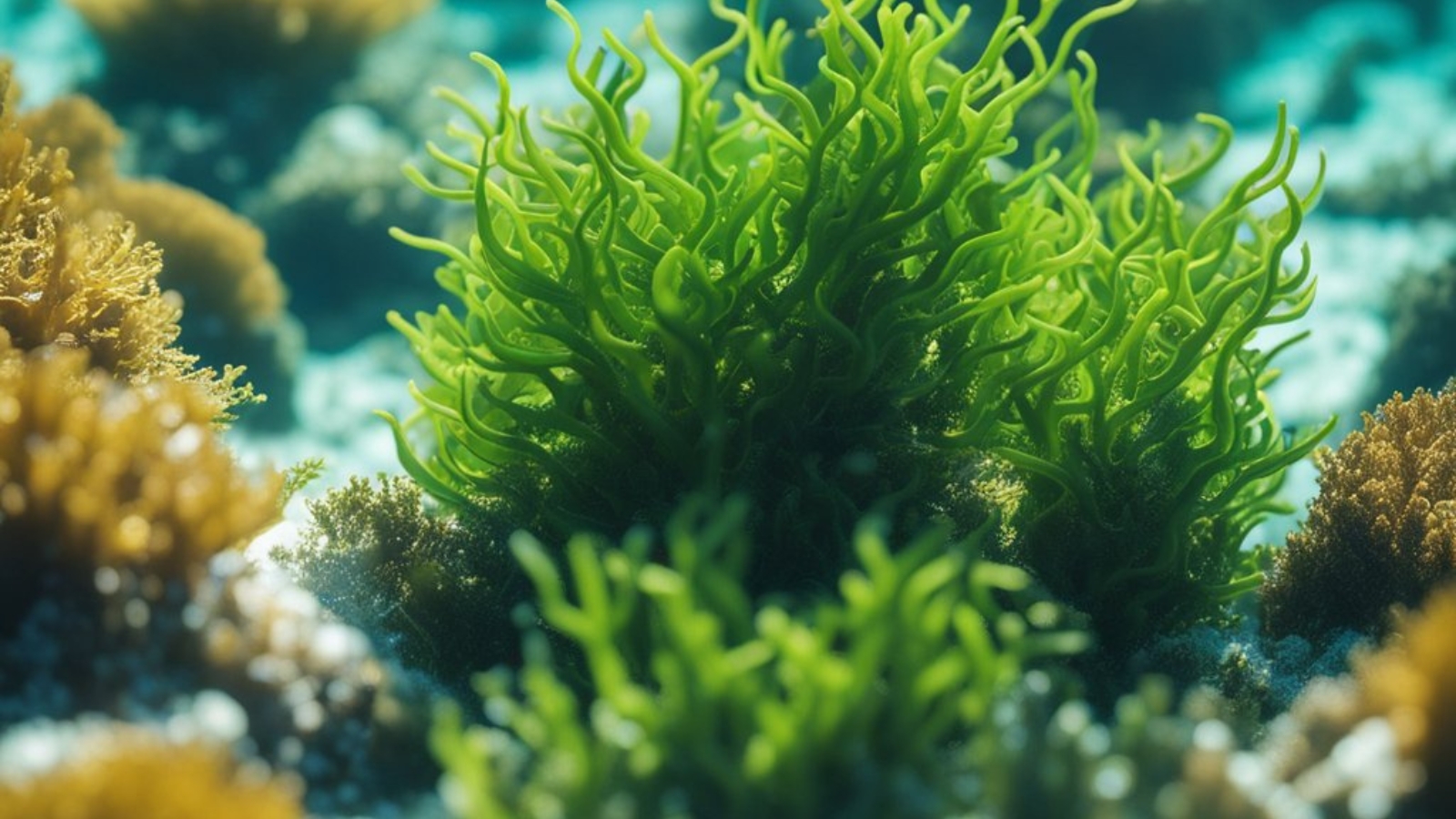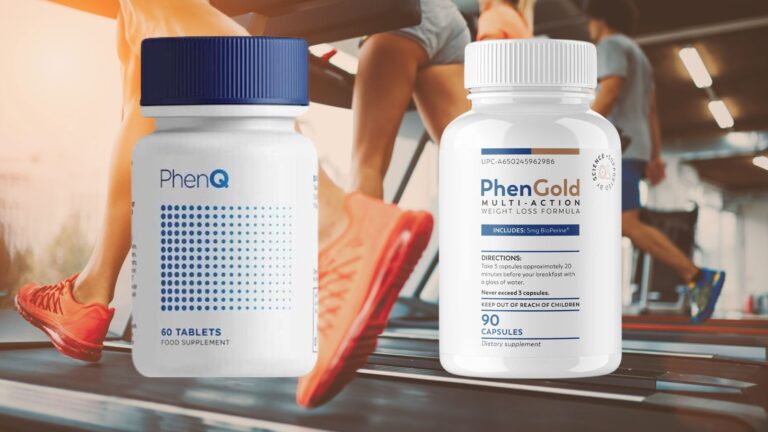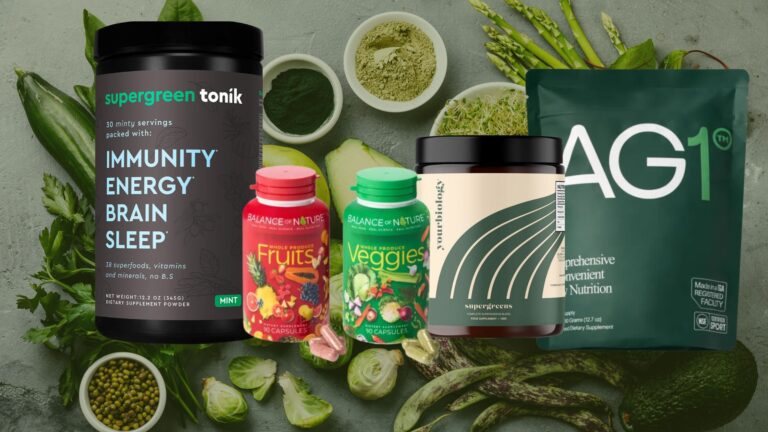Sea Moss, a type of red algae, has garnished a reputation as a superfood due to its rich nutritional content. I am intrigued by the potential health benefits it offers, which span across various aspects of well-being.
The algae, also known as Irish moss, contains a spectrum of vitamins and minerals, including iodine, potassium, calcium, and magnesium. Amidst the ongoing research, many individuals utilise sea moss for its purported ability to bolster the immune system, improve digestion, and enhance skin health.
My interest extends to how sea moss may impact thyroid function due to its natural source of iodine, an element essential for the synthesis of thyroid hormones. Additionally, some people incorporate sea moss into their diet for weight management and to boost their energy and vitality. As with many natural supplements, it’s not just the individual nutrients but how they synergistically support the body that makes sea moss a subject worth exploring.
Key Takeaways
- Sea moss is rich in essential nutrients, contributing to its superfood status.
- Including sea moss in one’s diet may support overall health, including thyroid and digestive functions.
- Its potential for improving energy levels and skin health warrants further investigation.
Nutritional Profile

As a nutrition enthusiast, I can confidently say that sea moss is a quite nutrient-dense seaweed. It’s a good source of several key vitamins and minerals that contribute to overall health.
Vitamins: Sea moss is rich in vitamins B2 (riboflavin) and B9 (folate). Riboflavin is vital for energy production, while folate is crucial for DNA synthesis and repair. Vital for skin health and immunity, sea moss also contains Vitamin E.
Minerals: My research indicates that sea moss offers a bounty of minerals. It’s particularly high in iodine, essential for thyroid function, and potassium, which is integral for muscle and nerve function.
Below is a concise breakdown of its mineral content:
- Iodine: Essential for thyroid health
- Potassium: Key for muscle and nerve function
- Calcium: Important for bone health
- Magnesium: Involved in over 300 biochemical reactions in the body
Let’s not overlook its fibre content, which promotes digestive health. Sea moss also packs in a range of antioxidants, which are compounds known to combat oxidative stress in the body, thus possibly playing a role in preventing chronic diseases.
Finally, the protein content in sea moss is also worth mentioning. Although not as high as in other protein-rich foods, it contains a variety of amino acids, which are the building blocks of protein, essential for body repair and growth.
Immune System Support
When I investigate the benefits of sea moss, particularly for the immune system, I find compelling evidence suggesting its potential role in promoting immune health. Sea moss is rich in vitamins and minerals like iron, magnesium, phosphorus, and zinc, which are crucial for maintaining a healthy immune response.

I’ve noticed that sea moss contains sulfated polysaccharides, which are known to support the immune system. These compounds may enhance the body’s natural defence mechanisms against pathogens. Research suggests that sea moss can contribute to phagocytosis, melanisation, encapsulation, and cell-to-cell communication, which are vital aspects of the immune response.
According to my findings, regular consumption of sea moss gel during the colder months could be particularly beneficial. It’s thought to help reinforce the immune system, making the body better equipped to fend off common viral infections that are prevalent during autumn and winter.
Here’s a quick look at the nutritional components of sea moss linked to immune health:
- Vitamin C: A powerful antioxidant, contributing to the protection of cells from oxidative stress.
- Zinc: Essential for immune cell function and signalling.
- Iron: Integral to the development of immune cells.
It’s important to recognise that while the benefits of sea moss are promising, it’s not a panacea. I always advise a balanced diet and healthy lifestyle for optimal immune system support. Sea moss can complement these practices, potentially providing additional defence against illness.
Digestive Health Benefits
In my research, I’ve found that Sea Moss can offer significant benefits for digestive health by supporting gut flora balance and aiding in detoxification.
Gut Flora Balance
I’ve discovered that Sea Moss is high in prebiotic fibre, which is essential for maintaining a healthy gut. This type of fibre feeds the good bacteria in my intestines, thus promoting a balanced gut microbiome. By fostering this equilibrium, I can help support my overall digestive function.
Detoxification
One of the key components I’ve found in Sea Moss is a phytonutrient that aids in the detoxification process of the digestive system. The mucilaginous consistency of Sea Moss helps to soothe the gut lining, providing a protective layer which can assist in flushing out toxins. Regular consumption of Sea Moss may improve gut regularity and contribute to a healthier digestive tract.
Skin Health Enhancement
I have explored the benefits of sea moss for skin health, a superfood rich in minerals and vitamins which are crucial for maintaining a healthy dermis. Notably, sea moss provides hydration and acts as an anti-ageing agent.
Anti-Ageing Properties
Sea moss is celebrated for its anti-ageing properties. The high sulphur content in sea moss helps reduce the excess sebum on the skin, fighting off the bacteria that can lead to acne. Studies like the one published on MDPI highlight its role in skin protection and preventing skin aging, which demonstrates its effectiveness in maintaining youthful skin.
Hydration and Protection
Proper hydration and protection are key for healthy skin, and sea moss excels in both. It is known to enhance the skin’s barrier function, helping to retain moisture, as detailed in research on MDPI. This same research explains how sea moss contains minerals that can help protect the skin from environmental stressors, therefore maintaining its resilience and radiance.
Thyroid Function
Sea moss plays an instrumental role in supporting thyroid health due to its rich source of iodine and its potential to aid in restoring hormonal balance.
Iodine Content
Iodine is a vital mineral for the proper function of the thyroid gland, and sea moss is known to have one of the highest iodine contents among natural foods. My thyroid gland requires this mineral to synthesise thyroid hormones, which regulate metabolism, energy production, and growth.
Hormonal Balance
In addition to iodine, sea moss contains other minerals that contribute to hormonal balance within the body. The thyroid hormones, such as thyroxine (T4), are crucial for regulating my body’s metabolism, and consuming sea moss can support the thyroid in maintaining these necessary levels. It’s important to ensure that these hormones remain at their optimal levels for my overall well-being.
Weight Management
I’ve found that sea moss can play a role in weight management. Its low calorie content and ability to promote the feeling of fullness may support weight loss efforts. My investigation into its properties reveals that the fibre content in sea moss is particularly noteworthy; this soluble fibre can swell in the stomach, leading to a reduced appetite and decreased calorie intake.
Table: Nutritional Benefits of Sea Moss Related to Weight Management
| Nutrient | Role in Weight Management |
|---|---|
| Fibre | Enhances satiety |
| Iodine | Supports thyroid function |
| Vitamins | Aids in metabolic processes |
Taking sea moss in conjunction with a healthy diet could potentially optimise metabolism and assist in weight control. Scientific studies have implied that the iodine found in sea moss can be crucial for maintaining a healthy thyroid function, which is paramount for regulating metabolism.
In my exploration, it is evident that sea moss also contains vitamins and minerals that contribute to overall health, which can be important when trying to manage weight. By incorporating sea moss into a balanced diet, I observe that it’s possible to benefit from its nutritional goodness without adding excessive calories.
Furthermore, there are reports of people incorporating sea moss into their diets and experiencing weight loss. Such anecdotes complement the idea that sea moss might be a beneficial addition to a weight management regimen.
However, I always recommend consulting with medical professionals before adding sea moss or any supplement to my diet, especially for those with specific health conditions or who are pregnant.
Energy and Vitality
I’ve discovered that sea moss, a type of red algae, can be a potent supplement for boosting energy and vitality. It’s particularly rich in iodine, a key mineral for thyroid function which ultimately regulates energy levels. A well-functioning thyroid translates to sustained energy throughout the day.
Here’s what I know about the components of sea moss that contribute to its energy-boosting properties:
- Iodine: Essential for thyroid health, which governs metabolism and energy use.
- Iron: Plays a crucial role in the production of energy from food and also prevents anaemia which is linked with fatigue.
In addition to these minerals, sea moss is touted for its high vitamin B and potassium content, both known to help reduce tiredness and support energy levels. My understanding is bolstered by the fact that sea moss has been traditionally used for centuries in local cultures for maintaining energy and reducing fatigue.
My Personal Experience:
Upon incorporating sea moss into my diet, I observed a perceptible increase in my day-to-day energy. This aligns with findings that sea moss has beneficial properties that can help in enhancing one’s energy and overall vitality.
A notable point in the discussions around sea moss is its role in supporting emotional wellbeing. With its nutrient-rich profile, it’s concluded that sea moss can support a balanced mood, which often correlates with a steady supply of energy.
For those exploring natural ways to enhance energy levels, sea moss might be worth considering. Its nutrient profile indeed suggests a potential for supporting vitality, and it’s one I regard as worthy of attention in a balanced diet.
Joint and Muscle Recovery

Sea moss, a type of red algae, has been gaining attention for its potential benefits in aiding joint and muscle recovery. Rich in minerals such as potassium, magnesium, and calcium, these nutrients play a crucial role in maintaining healthy muscle function and joint mobility.
My Mobility Experience:
During my investigation into natural recovery aids, I discovered that sea moss’s high potassium content helps to manage muscle contractions and alleviate muscle soreness following exercise. This intrigued me to incorporate sea moss into my routine, particularly after intense workouts to help my muscles recover.
How Sea Moss Assists:
- Reducing Stiffness: Minerals in sea moss contribute to reducing stiffness in the joints.
- Supporting Flexibility: The soothing effects can help maintain joint flexibility.
In a study I came across, participants experiencing joint discomfort reported a noticeable improvement when incorporating sea moss into their diet. This aligned with historical uses where sea moss was commonly utilised as a healing aid for those with joint issues.
My Daily Intake:
I include sea moss in my diet by adding it to smoothies or soups, which allows me to enjoy the nutritional benefits it offers for recovery. It’s important to use it in moderation, aiming for a balanced diet that supports overall health.
Cautionary Note:
As always, I advise consultation with a healthcare provider before starting any new supplement, especially for individuals with specific health conditions.
Discover more about the potential of sea moss in supporting joint and muscle recovery by looking into works that discuss the historical perspective of its therapeutic properties.
Heart Health
Sea moss is reputed for its potential benefits in supporting heart health. My focus here will be on how it may positively affect blood circulation and cholesterol regulation, which are crucial for maintaining a healthy heart.
Blood Circulation
I find that sea moss contains natural compounds that may enhance blood flow. It’s thought to act as a natural blood thinner, which supports smoother blood circulation. Moreover, the presence of potassium in sea moss helps to regulate blood pressure levels, ensuring that the cardiovascular system functions effectively.
Cholesterol Regulation
The role of sea moss in cholesterol regulation is particularly compelling. It is believed to contain a unique blend of omega-3 fatty acids, sterols and antioxidants which contribute to maintaining healthy cholesterol levels. By potentially reducing low-density lipoprotein (LDL) cholesterol – often termed ‘bad cholesterol’ – and promoting the stability of high-density lipoprotein (HDL) – ‘good cholesterol’, sea moss might aid in the prevention of cholesterol-related conditions, thus safeguarding heart health.
Respiratory Support
I find sea moss, also known as Irish moss, to be quite intriguing for its potential respiratory benefits. My investigation into this seaweed has revealed that it contains mucilaginous compounds, which may offer support for respiratory health. People have historically used it as a natural remedy for soothing the mucus membranes throughout the respiratory tract.
Here’s a breakdown of how sea moss might assist:
- Rich in Potassium Chloride: Potassium Chloride found in sea moss is believed to dissolve catarrh, a term referring to the inflammation of the mucous membranes with accompanying excess production of mucus, potentially alleviating congestion.
- Antioxidant Properties: It is well-documented that sea moss has antioxidants, which may play a part in neutralising free radicals and supporting the immune system, thus providing extra defense against respiratory conditions.
Additionally, I’ve come across a study suggesting that the sulfated polysaccharides in sea moss can be beneficial. These compounds might stimulate the immune response in the body, which in turn can have a positive impact on respiratory health.
In conclusion, while direct conclusive evidence is limited and further research is needed, the historical use and current understanding highlight sea moss as a supplement with potential respiratory support capabilities.
Mental Wellbeing
In exploring the effects of natural supplements on mental health, I’ve come across interesting research outlining the potential influence of seaweed consumption. Seaweed, and in particular sea moss, is often cited for its rich nutrient profile. My interest lies in how these nutrients might support cognitive functions and overall mental wellbeing.
Firstly, sea moss is a source of iodine, an element essential for healthy thyroid function. The thyroid has a significant impact on mood and cognitive functions. By supporting a stable and effectively functioning thyroid, sea moss may contribute to a balanced mental state.
I’ve also noticed that sea moss contains omega-3 fatty acids, particularly eicosapentaenoic acid (EPA) and docosahexaenoic acid (DHA). These fatty acids play a crucial role in brain health; they’re integral to the structure of brain cells and are known for their anti-inflammatory properties. It’s suggested that these compounds might aid in reducing symptoms linked to mental health conditions, such as depression and anxiety.
Another interesting component is potassium, an electrolyte associated with nerve function and stress reduction. Adequate potassium levels are necessary for maintaining proper electrical gradients in the body’s cells, including neurons. This proper functioning is critical for good mental health.
Lastly, it’s important to address mental wellbeing holistically, and lifestyle factors like diet play a significant role. Integrating nutrient-rich foods like sea moss could potentially offer a supplementary benefit. However, I’m aware that further research is necessary to confirm these effects, and any dietary changes should complement other established mental health interventions.
Please refer to the Consumption of seaweeds and the human brain study for more detailed insights into this subject.
Frequently Asked Questions
I find that there’s a growing interest in sea moss and its health benefits, which often leads to many questions. Here, I aim to address some of the most common queries.
What are the primary advantages of incorporating sea moss into one’s diet?
Sea moss is a type of seaweed that’s touted for its rich mineral content. My research suggests that regularly eating sea moss can provide benefits such as improved digestion, boosted immunity, and heightened skin health.
Are there any risks associated with the daily consumption of sea moss?
Although it’s generally considered safe for most people, sea moss can carry risks if consumed in excessive amounts. It has a high iodine content, which might affect thyroid function if not balanced properly.
How might sea moss contribute to overall bodily functions?
Sea moss contains a range of nutrients that can support critical bodily functions. For instance, it may promote thyroid health due to its iodine content, and supports gut health with its fibre.
Can you list the most significant nutrients found in sea moss?
Certainly, sea moss is notably high in iodine, potassium, calcium, and magnesium. It also contains vitamins A, E, and K, each playing vital roles in maintaining overall health.
In what ways does sea moss differ from region to region, such as between Jamaican and African varieties?
The nutrient profile and content in sea moss can vary based on where it’s harvested. For example, Jamaican sea moss may differ in iodine and mineral levels compared to those from Africa, due to variations in water temperature, sunlight exposure, and mineral content in the water.
What are the potential benefits of choosing sea moss supplements over natural forms?
Opting for sea moss supplements can offer convenience and a more concentrated dose of its nutrients. However, one must be mindful to choose reputable brands to ensure quality and avoid contaminants.






